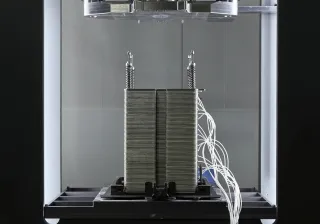New bio- and circular economy products respond to environmental challenges, but only if they can be manufactured profitably. The decisive phase is often the piloting of a new industrial process, which requires appropriate equipment and skills, as well as time and money. Start-ups in particular need strong support for this.
Few new bio- or circular economy products have reached the market unless the process is piloted on a scale greater than that of a laboratory. Manufacturing products from new types of raw materials will create technical and economic uncertainties, which must be reduced in order to make the huge investments needed for an industrial production facility.
Although the world is becoming digitised, experimental piloting may prove even more important than before because easily utilised raw materials are already in use. Now is the time for the difficult ones. Now under examination, alongside the actual manufacturing process, is how to separate raw material from miscellaneous waste or how a product coming from the process containing impurities can be purified. Often both are done.
Piloting is not only about the scaling of a process - it is also about product development and, for example, studying the environmental impact of the production and the product itself. Also waiting for the results of piloting are the manufacturers of the final products and the actors at up the value chain, such as waste handlers or the growers and refiners of bio-based raw materials.
Open access piloting platform – often essential for new start-ups
Many so-called open access piloting platforms have been built in Europe in the past couple of decades, mostly with the help of public funding. These service providers are beneficial especially in piloting in the early stages of commercialisation when excessive uncertainty might impede investment into one's own pilot plant
It is rarely even possible for start-ups to invest in their own pilots, and many lack experience in industrial processes. Consequently, open access piloting platforms with experts are often essential for start-ups – but also very useful for larger companies looking for a new direction for growth.
As start-ups are expected to become drivers of bio-, and circular economy growth, it is very important that both public and private funders should recognise the significance of piloting and prepare to cover its costs.
Getting a boost from VTT's piloting platforms have been developers of bio-based plastics and new protein products, and recyclers of textile fibres and plastics. Some of these are old hands from the chemical industry and process technology, and others, increasingly, are start-ups.
VTT Bioruukki developing to respond to future challenges
Growth in the bio- and circular economy is pushing piloting platforms to further development. The largest of VTT's platforms is the Espoo-based VTT Bioruukki Pilot Centre, which includes the piloting platforms of several different process technologies, such as thermochemistry, biomass processing, textile fibre manufacture, and hydrometallurgy. Most recently we have invested in an updated process chemistry platform.
The pilot platform for process chemistry especially supports the use of challenging raw materials in the manufacture of products of high added value by utilising versatile chemical reactors and separation technology equipment, and skilled personnel. With the help of an upgraded automation system, piloting is yielding increasing amounts of data needed in the scale-up of processes, and VTT Bioruukki has also a new extensively automated testing equipment for catalytic processes.
We are also upgrading the thermochemistry platform of the pilot centre to specifically serve developers of chemical recycling of plastics. Multi-layer plastic films and other plastics of mixed quality that cannot be recycled using today's methods are of special interest.
Advantage from international piloting network
Although there are many mutually complementary piloting platforms at VTT, even we do not have everything. We encourage developers to utilise the European Pilots4U networks as needed.
Open access piloting platforms supported through public funds offer European companies good starting points for worldwide success in the bio- and circular economy. Piloting that is of a high standard and correctly timed reduces the risks of business activities under development, while creating trust in a new product or technology throughout the value chain. I expect that funding that supports the EU's green transition will further accelerate the bioeconomy and circular economy from what it was – through piloting.













